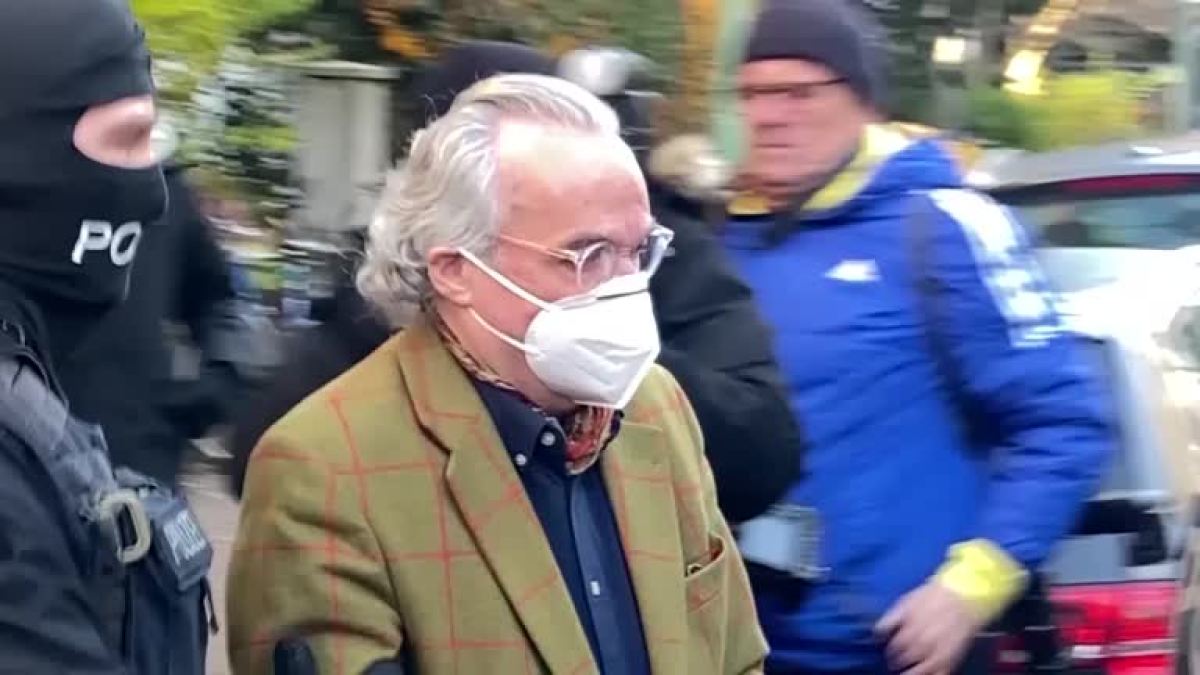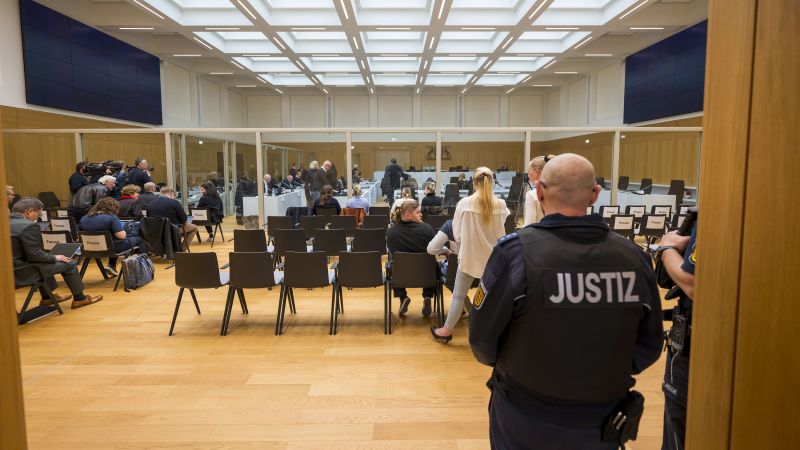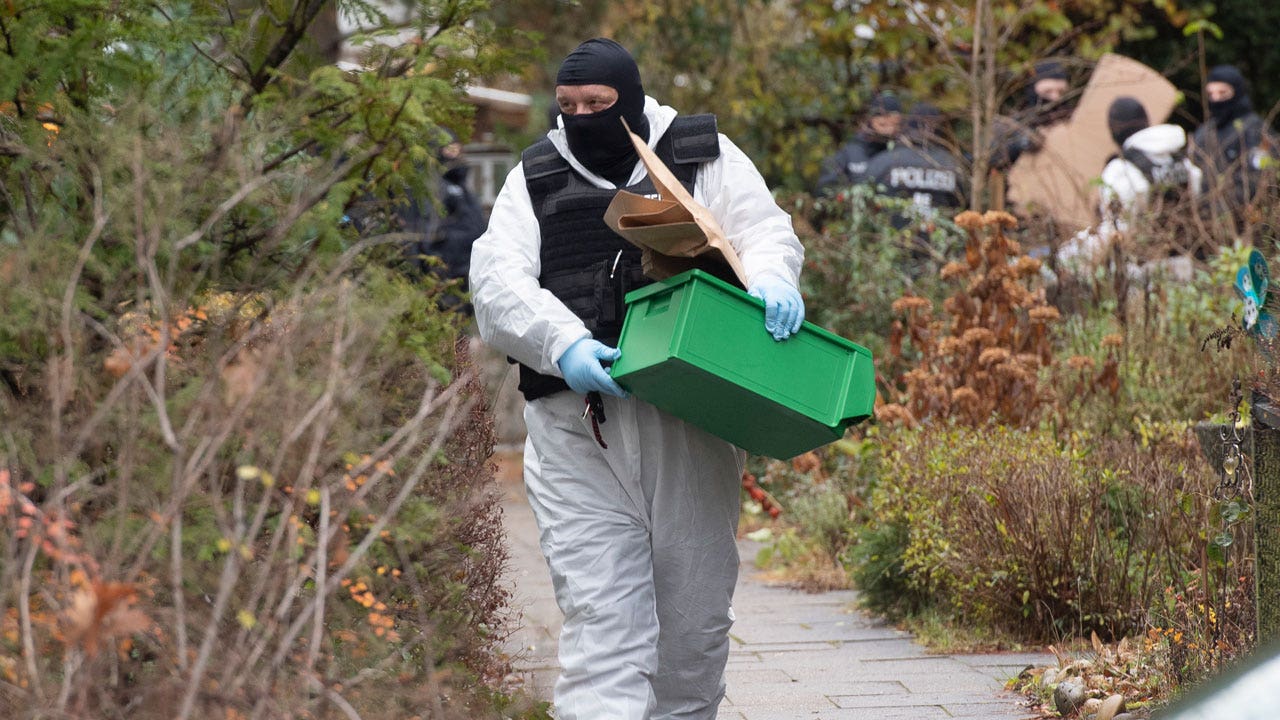
Nine suspects in Germany, including former soldiers and a member of parliament from the far-right party, are accused of plotting a coup to make Heinrich XIII Prince Reuss the country's leader. The group, linked to the Reichsbuerger movement, planned to overthrow the government and impose martial law. Charges of high treason and attempted murder have been brought against them, with detailed plans to seize power using armed units and violence. The trial will be held in three cities and focus on the military wing's activities.

Heinrich XIII Prinz Reuss (German: Heinrich XIII. Prinz Reuß, pronounced [ˈhaɪnʁɪç deːɐ̯ ˈdʁaɪˌtseːntə pʁɪnts ˈʁɔʏs]; born 4 December 1951) is a German businessman, far-right and monarchist activist, and member of the aristocratic House of Reuss family. A proponent of the Reichsbürger movement and antisemitic conspiracy theories, Reuss was arrested by German Federal Police in December 2022 due to his alleged leadership in the 2022 German coup d'état plot.

Germany has seen a surge in espionage allegations with six individuals, including top AfD party candidates, being arrested for suspected spying for China and Russia. Beyond the AfD party, arrests include German nationals of Russian origin planning sabotage in Ukraine and passing on advanced engine designs to Chinese intelligence. The BfV domestic intelligence agency played a crucial role in these cases, indicating a strong counter-espionage effort by German security authorities. These arrests followed Chancellor Olaf Scholz's recent talks with China's President Xi Jinping in Beijing.

Reichsbürgerbewegung ("Reich Citizens' Movement") or Reichsbürger ("Reich Citizen[s]", the German word is the same in singular and in plural) is a label for several anticonstitutional revisionist groups and individuals in Germany and elsewhere who reject the legitimacy of the modern German state, the Federal Republic of Germany, in favour of the German Reich.One typical claim is that the German Reich continues to exist in its pre-World War II borders, and that it is now governed by one of the Reichsbürger groups.Several incidents with violent members of the movement and illegal weapons depots earned the movement the attention of the media and the German authorities.: 20–21 The latter estimated that some 21,000 people belong to the movement in Germany as of July 2021.

Two Ukrainian servicemen, aged 23 and 36, were stabbed to death at a shopping center in Murnau, Germany. A 57-year-old Russian man was arrested on suspicion of murder. The victims were in Germany for medical rehabilitation and lived in Garmisch-Partenkirchen. More than one million Ukrainian refugees have come to Germany since Russia's invasion of Ukraine in 2022. Germany has provided significant military aid to Ukraine and treated over 1,000 wounded Ukrainians. Two alleged spies, dual German-Russian nationals, were also recently arrested for planning sabotage on military aid for Ukraine.

The leader of the far right Alternative for Germany (AfD) party has defended the actions of its leadership in connection with reports about the possible involvement of leading party politicians with Russia and China. "We will draw clear consequences if these things are confirmed against Mr Krah and Mr Bystron," Tino Chrupalla said on the German public broadcaster ZDF on Thursday evening. Both had given written assurances that there was nothing to the allegations and therefore the presumption of innocence applied. Maximilian Krah , a member of the European Parliament is the AfD's top candidate for the European elections in June, while AfD Bundestag member Petr Bystron is in second place on the election list. Following media reports about possible links to pro-Russian networks and possible financial payments, public prosecutors are examining whether investigations should be opened into both politicians.

Two Ukrainian men, aged 23 and 36, were stabbed to death at a shopping center in Murnau, Upper Bavaria, Germany. A 57-year-old Russian man was arrested as a possible suspect for the killings. The motive was unknown, and it wasn't clear if the three men knew each other. Germany has received over 1 million Ukrainian refugees since Russia's invasion in 2022, and it is also home to a significant Russian immigrant community and 2.5 million Russians of German ancestry.

European Commission President Ursula von der Leyen mocked the far-right Alternative for Germany (AfD) party's European parliamentary election campaign launch, which has been overshadowed by spying scandals and suspicions of foreign influence-buying. The AfD's lead candidate, Maximilian Krah , sat out the campaign launch event on Saturday, less than a week after a top aide to Krah was arrested on allegations of spying for China. Krah himself is currently the subject of a preliminary investigation by German prosecutors into potential payments from Russia and China, and whether any payments might have influenced his work in the European Parliament. "First covered up by the executive board, then hidden by the executive board - how about the AfD finally coming out with the truth?" said von der Leyen on Sunday at an event for the youth wing of her centre-right Christian Democratic Union (CDU) party in the western German city of Aachen. AfD leaders have decided to stick with Krah despite the scandal, but removed him from the programme for the party's campaign launch event on Saturday.

Germans (German: Deutsche, pronounced [ˈdɔʏtʃə] ) are the natives or inhabitants of Germany, or sometimes more broadly any people who are of German descent or native speakers of the German language. The constitution of Germany, implemented in 1949 following the end of World War II, defines a German as a German citizen. During the 19th and much of the 20th century, discussions on German identity were dominated by concepts of a common language, culture, descent, and history. Today, the German language is widely seen as the primary, though not exclusive, criterion of German identity. Estimates on the total number of Germans in the world range from 100 to 150 million, most of whom live in Germany.The history of Germans as an ethnic group began with the separation of a distinct Kingdom of Germany from the eastern part of the Frankish Empire under the Ottonian dynasty in the 10th century, forming the core of the Holy Roman Empire. In subsequent centuries the political power and population of this empire grew considerably. It expanded eastwards, and eventually a substantial number of Germans migrated further eastwards into Eastern Europe. The empire itself was politically divided between many small princedoms, cities and bishoprics. Following the Reformation in the 16th century, many of these states found themselves in bitter conflict concerning the rise of Protestantism. In the 19th century, the Holy Roman Empire dissolved, and German nationalism began to grow. The Kingdom of Prussia incorporated most Germans into its German Empire in 1871, and a substantial additional number of Germans were in the multiethnic kingdom of Austria-Hungary. During this time, a large number of Germans emigrated to the New World, particularly to the United States, especially to present-day Pennsylvania. Large numbers also emigrated to Canada and Brazil, and they established sizable communities in New Zealand and Australia. The Russian Empire also included a substantial German population.Following the end of World War I, Austria-Hungary and the German Empire were partitioned, resulting in many Germans becoming ethnic minorities in newly established countries. In the chaotic years that followed, Adolf Hitler became the dictator of Nazi Germany and embarked on a genocidal campaign to unify all Germans under his leadership. His Nazi movement defined Germans in a very broad way which included Austrians, Luxembourgers, eastern Belgians, and so-called Volksdeutsche, which were ethnic Germans elsewhere in Europe and globally. However, this Nazi conception expressly excluded German citizens of Jewish or Roma background. Nazi policies of military aggression and its persecution of those deemed non-Germans in the Holocaust led to World War II in which the Nazi regime was defeated by allied powers, led by the United States, the United Kingdom, and the former Soviet Union. In the aftermath of Germany's defeat in the war, the country was occupied and once again partitioned. Millions of Germans were expelled from Central and Eastern Europe. In 1990, West Germany and East Germany were reunified. In modern times, remembrance of the Holocaust, known as Erinnerungskultur ("culture of remembrance"), has become an integral part of German identity.Owing to their long history of political fragmentation, Germans are culturally diverse and often have strong regional identities. Arts and sciences are an integral part of German culture, and the Germans have been represented by many prominent personalities in a significant number of disciplines, including Nobel prize laureates where Germany is ranked third among countries of the world in the number of total recipients.

Reuss (German: Reuß [ʁɔɪ̯s], ROYSS) was the name of several historical states located in present-day Thuringia, Germany. Several lordships of the Holy Roman Empire which arose after 1300 and became Imperial Counties from 1673 and Imperial Principalities in the late 18th century were ruled by the House of Reuss.A varying number of these counties came into being by partition; they were partially merged and divided again. After the end of the empire in 1806, the principality of the elder line, as well as several of the younger, became sovereign member states of the German Confederation, with the younger ones merging into a unified principality by 1848. The two remaining territories became federal principalities of the German Empire in 1871, the Principality of Reuss Elder Line with the state capital of Greiz and the Principality of Reuss Younger Line with the state capital of Gera. Both states were ruled by the House of Reuss until the German Revolution of 1918–1919. The head of each branch bore the German title Fürst (Prince, as head of a princely house) while their children and all other members of the house bore the title Prinz/Prinzessin (Prince/Princess, as agnate members of a princely house).Since the end of the 12th century, all male members of the House of Reuss are named Heinrich (English: Henry), in honour of Henry VI, Holy Roman Emperor (1190–1197), to whom they owed the dominions of Weida and Gera. For the purpose of differentiation, they are given order numbers according to certain systems (see below, section Numbering of the Heinrichs), and in private life they are distinguished by nicknames.

Germany, officially the Federal Republic of Germany, is a country in the western region of Central Europe. It is the second-most populous country in Europe after Russia, and the most populous member state of the European Union. Germany lies between the Baltic and North Sea to the north and the Alps to the south. Its 16 constituent states have a total population of over 84 million, covering a combined area of 357,600 km2 (138,100 sq mi) and sharing land borders with Denmark to the north, Poland and the Czech Republic to the east, Austria and Switzerland to the south, and France, Luxembourg, Belgium, and the Netherlands to the west. The nation's capital and most populous city is Berlin and its main financial centre is Frankfurt; the largest urban area is the Ruhr.Settlement in what is now Germany began in the Lower Paleolithic, with various tribes inhabiting it from the Neolithic onward, chiefly the Celts. Various Germanic tribes have inhabited the northern parts of modern Germany since classical antiquity. A region named Germania was documented before AD 100. In 962, the Kingdom of Germany formed the bulk of the Holy Roman Empire. During the 16th century, northern German regions became the centre of the Protestant Reformation. Following the Napoleonic Wars and the dissolution of the Holy Roman Empire in 1806, the German Confederation was formed in 1815.Formal unification of Germany into the modern nation-state commenced on 18 August 1866 with the North German Confederation Treaty establishing the Prussia-led North German Confederation later transformed in 1871 into the German Empire. After World War I and the German Revolution of 1918–1919, the Empire was in turn transformed into the semi-presidential Weimar Republic. The Nazi seizure of power in 1933 led to the establishment of a totalitarian dictatorship, World War II, and the Holocaust. After the end of World War II in Europe and a period of Allied occupation, in 1949, Germany as a whole was organized into two separate polities with limited sovereignty: the Federal Republic of Germany, generally known as West Germany, and the German Democratic Republic, known as East Germany, while Berlin continued its de jure Four Power status. The Federal Republic of Germany was a founding member of the European Economic Community and the European Union, while the German Democratic Republic was a communist Eastern Bloc state and member of the Warsaw Pact. After the fall of the communist led-government in East Germany, German reunification saw the former East German states join the Federal Republic of Germany on 3 October 1990.Germany has been described as a great power with a strong economy; it has the largest economy in Europe. As a global power in industrial, scientific and technological sectors, it is both the world's third-largest exporter and importer. As a developed country it offers social security, a universal health care system, and tuition-free university education. Germany is a member of the United Nations, European Union, NATO, Council of Europe, G7, G20, and OECD. It has the third-greatest number of UNESCO World Heritage Sites.





ABC News

https://apnews.com/author/kirsten-grieshaber

NBC

Fox News

Inke Kappeler

Al Jazeera

Wikipedia

PANORA

Wikipedia

PANORA

PANORA

PANORA

PANORA

Wikipedia

Wikipedia

Wikipedia